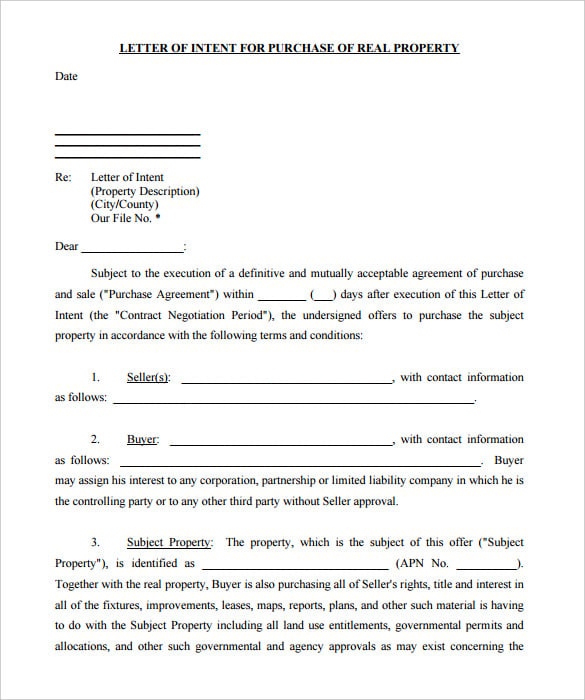Imagine: you’ve found the perfect home, the one that makes your heart sing. The spacious kitchen, the sunny living room, the backyard that whispers of summer barbecues. But before you can start planning your housewarming party, there’s a crucial step: the Letter of Intent (LOI). This document, often overlooked, is a powerful tool in real estate negotiations, signaling your serious interest and setting the stage for a successful purchase.

Image: tutore.org
Ready to dive into the world of LOIs? We’ll unravel the mysteries of this essential document, from its components to its uses, empowering you to confidently navigate the path to your dream home.
What Is a Letter of Intent (LOI)?
A Letter of Intent, in real estate, serves as a non-binding agreement outlining your commitment to purchasing a property. It’s essentially a preliminary contract, outlining the major terms of the purchase, such as price, financing, and closing date. While not legally enforceable, the LOI signals your serious intent to buy, giving the seller confidence in your offer and setting the groundwork for the final purchase agreement.
Why Should You Use a Letter of Intent?
Think of the LOI as a handshake agreement, a pact that demonstrates your commitment to the purchase. Here’s why it’s a valuable tool in the real estate landscape:
- Sets the Stage. It clearly lays out the terms of the purchase upfront, avoiding misunderstandings and ensuring everyone’s on the same page.
- Provides Confidence. It reassures the seller that you’re a serious buyer, increasing the likelihood of your offer being accepted.
- Starts the Negotiation Process. It opens the door for further negotiations and allows you to fine-tune terms before the final contract.
- Time Saver. It streamlines the purchase process, saving everyone involved valuable time and effort.
Essential Components of a Letter of Intent
A well-crafted LOI should encompass these crucial elements:
- Property Identification: Clearly state the address and legal description of the property being purchased.
- Purchase Price: Specify the agreed-upon purchase price, expressed as a dollar amount.
- Financing: Outline the method of financing, whether it’s a cash purchase, mortgage, or any other financing arrangement.
- Closing Date: Indicate the target date for closing the transaction, reflecting your timeline and expectations.
- Contingencies: List any conditions that need to be met before the purchase is finalized. This could include financing approval, property inspections, or the sale of your current home.
- Earnest Money Deposit: State the amount of earnest money you’re willing to deposit as a show of good faith.
- Agreement Expiration: Specify the duration of the LOI, outlining how long the offer is valid.
- Signatures: Both buyer and seller should sign the LOI, confirming their agreement to the terms.
![Letter of Intent (LOI) Template & Sample [Free PDF Example]](https://legaltemplates.net/wp-content/uploads/documents/letter-of-intent/letter-of-intent-purchase-real-estate.png)
Image: saca.aussievitamin.com
Crafting Your Letter of Intent
Crafting a compelling LOI requires careful attention to detail. Here are tips for creating a document that resonates and gets your offer accepted:
- Be Clear and Concise: Avoid jargon and ensure the language is easily understood by all parties involved.
- Demonstrate Your Enthusiasm: Express your sincere interest in the property and your commitment to closing the deal.
- Stay Flexible: While the LOI lays out your terms, acknowledge that negotiations are possible and you’re open to adjustments.
- Consider Legal Advice: Consult with a real estate attorney to ensure your LOI is legally sound and protects your interests.
Sample Letter of Intent
To understand the structure and content, let’s look at a sample LOI:
[Your Name]
[Your Address]
[Your Phone Number]
[Your Email Address]
[Date]
[Seller’s Name]
[Seller’s Address]
Re: Letter of Intent to Purchase Real Estate
Dear [Seller’s Name],
This letter expresses my intent to purchase the property located at [Property Address].
The purchase price shall be [Purchase Price]. The financing for this transaction will be through [Financing Method] with a closing date anticipated to be no later than [Closing Date].
This offer is contingent upon the following:
- [List Contingencies].
An earnest money deposit of [Earnest Money Amount] will be deposited with [Escrow Company Name] upon execution of this Letter of Intent. This offer is valid for [Number] days.
I understand this Letter of Intent is not legally binding and is subject to the execution of a formal purchase agreement. Please review its contents and contact me at your convenience to discuss next steps.
Sincerely,
[Your Name]
Beyond the LOI: Navigating the Journey
While the LOI sets the stage, remember, it’s just the beginning of the journey. You’ll need to work closely with your real estate agent, lender, and attorney to navigate the remaining steps:
- Due Diligence: Conduct thorough inspections and research to ensure the property matches your expectations.
- Negotiation: Fine-tune the terms of the purchase agreement with the seller, addressing any concerns or adjustments.
- Closing: Finalize all legal documents and transfer the title of the property to your name.
Letter Of Intent To Buy Real Estate Sample
Final Thoughts
The Letter of Intent is a powerful tool in your real estate arsenal. It sets the stage for a smooth and successful purchase, ensuring your offer is taken seriously and laying the groundwork for a seamless transition into your new home.
Remember, using a well-crafted LOI alongside the guidance of experienced professionals can be the key to achieving your real estate goals. So, prepare your LOI, put your best foot forward, and get ready to step into the exciting world of homeownership!






